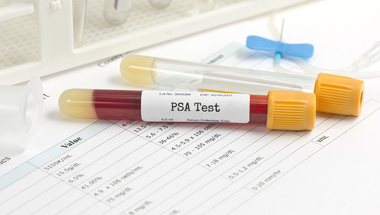Balanced information on the PSA blood test
NHS guidelines and Prostate Cancer UK’s risk checker
What is the PSA blood test?
It is a measure of the amount of prostate-specific antigen (a protein) in your blood stream. It can show if there’s anything wrong with your prostate. A high PSA could mean you have cancer, but PSA can also be raised by having an enlarged prostate, an infection, exercise, or ejaculation. To know for sure, you would need to have more tests including an MRI scan.
What do the NHS guidelines say about who can have a PSA blood test?
There are two separate guidelines. NICE guideline NG12 is for if a man has symptoms that might create a suspicion of prostate cancer – it says to consider a PSA test if there are any changes to how you pee, or experiencing erectile dysfunction or visible blood in pee.
But, prostate cancer often has no symptoms, so there is another set of NHS guidelines for testing men without symptoms called the Prostate Cancer Risk Management Programme (PCRMP). It states:
“Any asymptomatic man, aged 50 and over can make an appointment with their GP to discuss having the PSA test. GPs should not proactively raise the issue with asymptomatic men.
The PCRMP provides good quality evidence-based information to help guide primary health care professionals in these discussions. Men aged 50 and over who decide to have a PSA test based on this balanced information can do so for free on the NHS.”
What is the NHS advice to men?
There is an official NHS advice sheet for men who want a PSA test.
Does Prostate Cancer UK's risk checker contradict NHS advice?
The risk checker closely mirrors the language and structure of the official information sheet for men. Here’s a comparison of key topics:
| Topic | NHS language | Risk checker language |
| About risk |
“You are at higher risk of developing prostate cancer if you:
|
Men are told “You are at higher risk of getting prostate cancer” if they are:
|
| About speaking to a GP |
“Before making a decision, you may want to talk to your GP.” and “Talk to your GP about the possible advantages and disadvantages of the test and your own risk of prostate cancer.” |
“You may want to speak to your GP about your risk. Many GPs offer phone and video appointments, so you may not need to go in.” and “We recommend that if you are at higher risk, you talk to your GP about the pros and cons of the PSA blood test.” |
| About symptoms |
“Most early stage prostate cancers do not have any symptoms.” |
“Prostate cancer often has no symptoms, so don’t wait for symptoms if you want to talk to your GP about your risk of prostate cancer.” |
| About pros and cons of the PSA blood test |
Possible advantages
Possible disadvantages
|
To help you decide if it’s right for you, here are some facts about the PSA blood test.
So should I have a PSA blood test or not?
|
Why isn’t the language in the risk checker identical to the NHS information?
We did extensive audience testing to design information that was clear, helped men to understand the pros and cons of the test and make a genuine informed decision about whether or not to have a PSA test. Information is delivered in bite-sized chunks that enable men to digest it at their own pace. We have set out the full process for designing the content in our peer-reviewed publication about the development of the risk checker. Crucially we found that men use the Risk Checker for an average time of 9 minutes 28 seconds. Providing men with information on an online tool that they can read in their own time not only enables us to support them in making a proper informed choice, but actually saves GP time as it ensures that men are fully informed before visiting the GP.
Are there areas where the advice differs?
Yes. Current NHS advice is consistent for all men, regardless of their individual risk. In contrast, in line with a 2024 clinical consensus that called for more proactive approaches towards men at highest risk, the risk checker gives a stronger recommendation for these men. Men from the age of 45 with a family history of prostate cancer and Black men aged 45 and over are told “we strongly recommend you speak to your GP about your risk”.
Furthermore, whilst the NHS advice acknowledges that “most research into PSA testing has been among men aged between 50 and 69” there is no guidance for men aged 70+. However, there is strong evidence that men aged over 70 with no symptoms related to prostate cancer are less likely to benefit from having a PSA test. Therefore, the risk checker informs men over 70 without additional risk factors that “prostate cancer that appears in men over 70 is usually slow growing. It’s unlikely to affect the life expectancy or quality of life of men your age, unless you have symptoms.”
Updated November 2024 | Due for Review: November 2026




